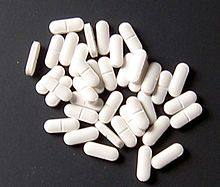安眠药
外观
(重定向自睡眠药)

安眠药(英語:Hypnotic) (源自希腊语 Hypnos, sleep(睡眠)),是一类精神药物,主要用于治疗失眠和手术麻醉。在抗精神病药被发现以前也用于治疗精神分裂症。[1]
种类
[编辑]巴比妥酸鹽類(Barbiturates)
[编辑]是一類作用於中樞神經系統的鎮靜劑,屬於巴比妥酸的衍生物,其應用範圍可以從輕度鎮靜到完全麻醉,還可以用作抗焦慮藥、安眠藥、抗痙攣藥。長期使用則會導致物質依賴。
第一代抗組織胺(Antihistamine)
[编辑]常見的非處方安眠藥,如氯苯那敏(chlorpheniramine)苯海拉明(diphenhydramine)
喹唑啉酮(Quinazolinone)
[编辑]目前用於鎮靜(Sedation)的只有Afloqualone與Cloroqualone
苯二氮䓬類(benzodiazepines)
[编辑]苯二氮卓适合用来短期内治疗失眠。不推荐连续使用苯二氮卓类药物2-4星期,因为这会导致依赖性。最好间隔性地服用苯二氮卓类药物,并且将剂量保持在最低有效剂量。苯二氮卓类药物通过缩短入睡时间、延长睡眠时间和减少醒后的困倦感来治疗因失眠导致的问题。[2][3]
常用的苯二氮卓类药物的代表有阿普唑仑(Alprazolam,佳静安定、贊安諾錠Xanax)、劳拉西泮(Lorazepam)、地西泮(Diazepam)、氯硝西泮(Clonazepam)、氟硝西泮(Flunitrazepam,俗稱「FM2」)。
非苯二氮䓬類(non- benzodiazepines)
[编辑]非苯二氮卓类药物是一类与苯二氮卓类药物非常相似的精神药物。非苯二氮卓类与苯二氮卓类在药效学性质上非常相似,也有着相似的优点、不良反应和风险,然而,两者的化学结构却完全不同,因此在分子水平上,非苯二氮卓类和苯二氮卓类没有任何关系。[4]
常用的非苯二氮卓类药物有:佐匹克隆(Zolpiclone),艾司佐匹克隆(Eszopiclone),扎来普隆(Zaleplon),唑吡坦(Zolpidem)。
其他药物
[编辑]褪黑色素
[编辑]抗组胺药
[编辑]抗抑郁药
[编辑]抗精神病药物
[编辑]食欲素受体拮抗剂
[编辑]参考文献
[编辑]- 引用
- ^ Geschichte der medikamentösen Therapie der Schizophrenie. 1992. ISBN 9783927408821.
- ^ Technology Appraisal Guidance 77. Guidance on the use of zaleplon, zolpidem and zopiclone for the short-term management of insomnia (PDF). National Institute for Clinical Excellence. April 2004 [2009-07-26]. (原始内容 (PDF)存档于2008-12-03).
- ^ Ramakrishnan, K.; Scheid, D. C. Treatment options for insomnia. American Family Physician. August 2007, 76 (4): 517–26 [2015-09-06]. PMID 17853625. (原始内容存档于2020-05-19).
- ^ Siriwardena, A. N.; Qureshi, Z.; Gibson, S.; Collier, S.; Latham, M. GPs' attitudes to benzodiazepine and 'Z-drug' prescribing: a barrier to implementation of evidence and guidance on hypnotics. Br J Gen Pract. December 2006, 56 (533): 964–7. PMC 1934058
 . PMID 17132386.
. PMID 17132386. 
- ^ Haria, M.; Fitton, A.; McTavish, D. Trazodone. A review of its pharmacology, therapeutic use in depression and therapeutic potential in other disorders. Drugs & Aging. 1994-04, 4 (4) [2023-10-18]. ISSN 1170-229X. PMID 8019056. doi:10.2165/00002512-199404040-00006. (原始内容存档于2023-12-02).
- ^ Levate (amitriptyline), dosing, indications, interactions, adverse effects, and more. reference.medscape.com. [2023-10-18]. (原始内容存档于2023-12-18).
